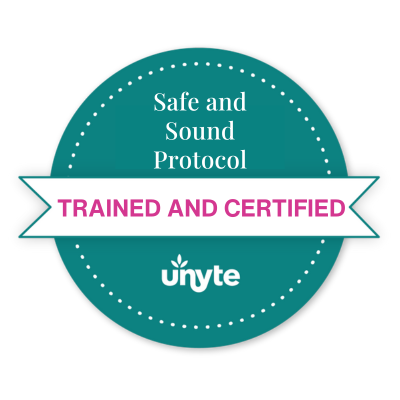Five hours of music. Long lasting Impact.
The Safe and Sound Protocol (SSP) is a powerful listening therapy designed to help regulate the nervous system, so you can better connect with yourself, others and the world around you.
Humans need social connection.
Subconsciously, your nervous system is always looking for cues of safety from other people through things like body language, facial expression or tone of voice.
But if you have a harder time interpreting these cues of safety due to past experiences or the way you take in information, your brain and body can misinterpret these cues, limiting your ability to connect in a meaningful way.
How does SSP work?
Through the specially filtered music, the SSP sends cues of safety to your nervous system, building the foundation for awareness, embodiment and resilience.
Benefits of nervous system regulation are…
Improved response to stress:
When our nervous system is regulated, it’s easier to sleep, eat, digest, concentrate, communicate, and participate in meaningful relationships with others. We can better respond to difficult situations and move past them instead of reacting and getting “stuck” in them.
Better emotional resilience:
Become attuned to and more in control of emotions, so you can move through temporary setbacks with more flexibility and ease.
More social connection and deeper relationships:
By activating the part of your brain that allows us to be more social, affectionate and connected, the SSP can help shift you into a state where you are more comfortable and at ease engaging with others, leading to deeper and more meaningful relationships.
SSP works with other therapies and supports many symptoms and conditions including:
Depression and anxiety
Neurodevelopmental differences including autism, hyperactivity and attention Learning difficulties
Sensory processing
Trauma history
And more
SSP is safe and effective for all ages and can be listened to from almost anywhere.
Your Role:
As the listener, all that is required of you during a session is to simply listen to the music and to let your provider know of any feelings or sensations, whether emotional or physical, that may arise.
Your provider may also have you engage in light activity during your listening sessions, such as stretches, breathing exercises or drawing. Be sure to stay in close communication with your provider, so they can adjust your listening plan to suit your needs.
Your Provider’s Role:
Your certified provider will be your guide along your SSP journey. They are trained to make sure that you are ready even before you start listening to the music, and will recommend an individualized listening plan for you. They will provide education, answer all your questions and prepare you for all that you may experience once you begin.
During the listening, they will monitor your progress and make sure you are not completing the program too quickly or slowly. They will support and work with you to find the right pace and conditions for the optimal listening experience for you.

